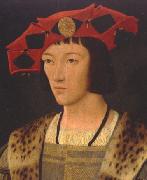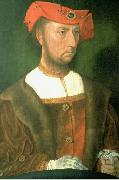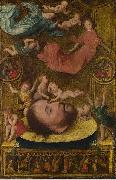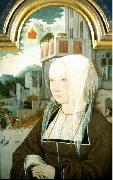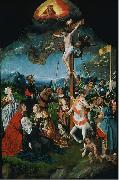|
||||||||||
|
|
||||||||||
|
Portrait of Charles VIII Gemälde ID:: 83497 Siehe Galerie in Schweden |
Portrait of Charles VIII ca. 1520/30 Medium Oil on panel Dimensions 32.5 x 42 cm (12.8 x 16.5 in) cyf ca._1520/30 _ Medium_Oil_on_panel _ Dimensions_32.5_x_42_cm_(12.8_x_16.5_in) _ cyf |
|||||||||
|
|
||||||||||
|
Portrait of a unknown man Gemälde ID:: 84279 Siehe Galerie in Schweden |
Portrait of a unknown man Oil on panel Dimensions 42 x 29 cm cyf Oil_on_panel _ Dimensions_42_x_29_cm _ cyf |
|||||||||
|
|
||||||||||
|
The Head of Saint John the Baptist Gemälde ID:: 84418 Siehe Galerie in Schweden |
The Head of Saint John the Baptist ca. 1510-1525 Medium English: Oil on panel Dimensions 26 x 17.1 cm cyf ca._1510-1525 _ Medium_English:_Oil_on_panel_ Dimensions_26_x_17.1_cm _ cyf |
|||||||||
|
|
||||||||||
|
Portrait of a unknown woman Gemälde ID:: 86132 Siehe Galerie in Schweden |
Portrait of a unknown woman Date c. 1525 Medium : oil on panel Dimensions 48 x 32 cm cjr Date_c._1525 _ Medium_:_oil_on_panel_ Dimensions_48_x_32_cm _ cjr |
|||||||||
|
|
||||||||||
|
The Crucifixion Gemälde ID:: 86160 Siehe Galerie in Schweden |
The Crucifixion Date ca. 1530 Medium : Oil on panel Dimensions 114.6 x 74.6 cm cjr Date_ca._1530 _ Medium_:_Oil_on_panel_ Dimensions_114.6_x_74.6_cm _ cjr |
|||||||||
|
|
||||||||||
| Vorheriger Künstler Nächster Künstler | ||||||||||
|
|
||||||||||
| Jan Mostaert | ||||||||||
| (c. 1475 -1555/1556) was a Dutch painter of portraits and religious subjects, though his most famous creation was the "West Indies Landscape". Although little is known of him, Mostaert was born and lived in Haarlem for most of his life. He worked as portraitist for Margaret of Austria, Regent of the Netherlands. Much of his work was destroyed in the great fire of Haarlem in 1576, and some paintings once attributed to him are now attributed to Adriaen Isenbrant. Mostaert was born in or about 1475 in Haarlem, Netherlands, to a famous noble family. Said to be handsome, eloquent and polite, Mostaert honed his craft under the guidance of Jacob van Haarlem, who may have actually been the anonymous "Master of the Brunswick Diptych". He is also said to be linked to the early Haarlem School of Painting. Mostaert's name first appeared in city records in 1498, the year he married and bought a house in his birthplace. He is also mentioned in Haarlem archives from 1527 to 1554. In 1500 Mostaert was commissioned to paint the shutters for a receptacle housing the relics of Saint Bavo in the Groote Kerk, Haarlem. From this date he began to be listed in the records of the Haarlem Guild of St. Luke, and continued to be frequently listed until 1549. He became deacon of the painters' guild in 1507, and again in 1543 and 1544. His earliest works are noticeably influenced by Geertgen tot Sint Jans, an earlier Haarlem artist. Some believed that Mostaert was actually apprenticed to tot Sint Jans but it is doubtful that the artist had any apprentices or workshop assistants during his career. From tot Sint Jans, Mostaert adopted a refined style and thoughtful compositions for his works, as well as the stiff, angular look of his figures. St. ChristopherBetween 1510 and 1516 Mostaert developed a delicate style where his doll-like figures inhabited bright, blue-skied landscapes, as for example in his "Adoration of the Magi" (c. 1510-15). His refined brushwork is precise, with an almost religious attention to detail. Also of note is the landscape, which demonstrates his leanings towards more romantic views with expansive hills. During the 1520s Mostaert was also influenced by Joachim Patinir's take on landscapes. Mostaert's "St. Christopher", a painting with a landscape that features a river receding into an expansive and hilly background, was once even attributed to Patinir. Mostaert's portrait work of this earlier period includes a piece entitled "Portrait of Abel van den Coulster" (c. 1500-10), in which an elegant, thin-faced man is situated in equally elegant surroundings. Mostaert was known for copying original portraits for some of his courtly commissions but, as is the case with the "Portrait of Abel", he also painted figures from life and added aristocratic touches. He was known for presenting his portrait sitters in three-quarter-length and placing their hands on cushions. | ||||||||||
|
|
||||||||||
IntoFineArt Co,.Ltd.








